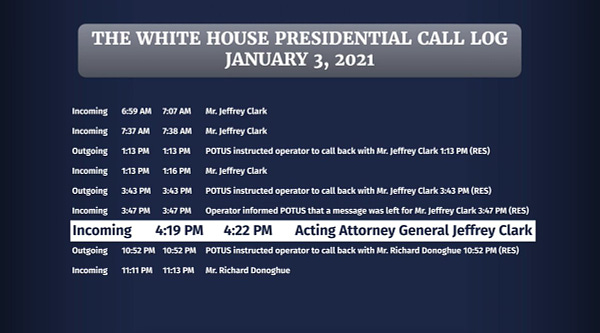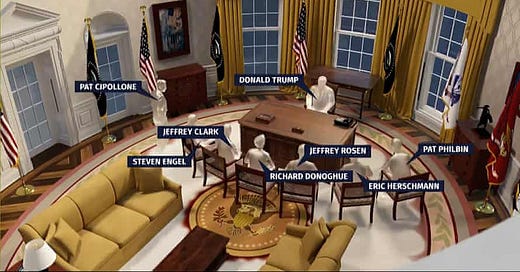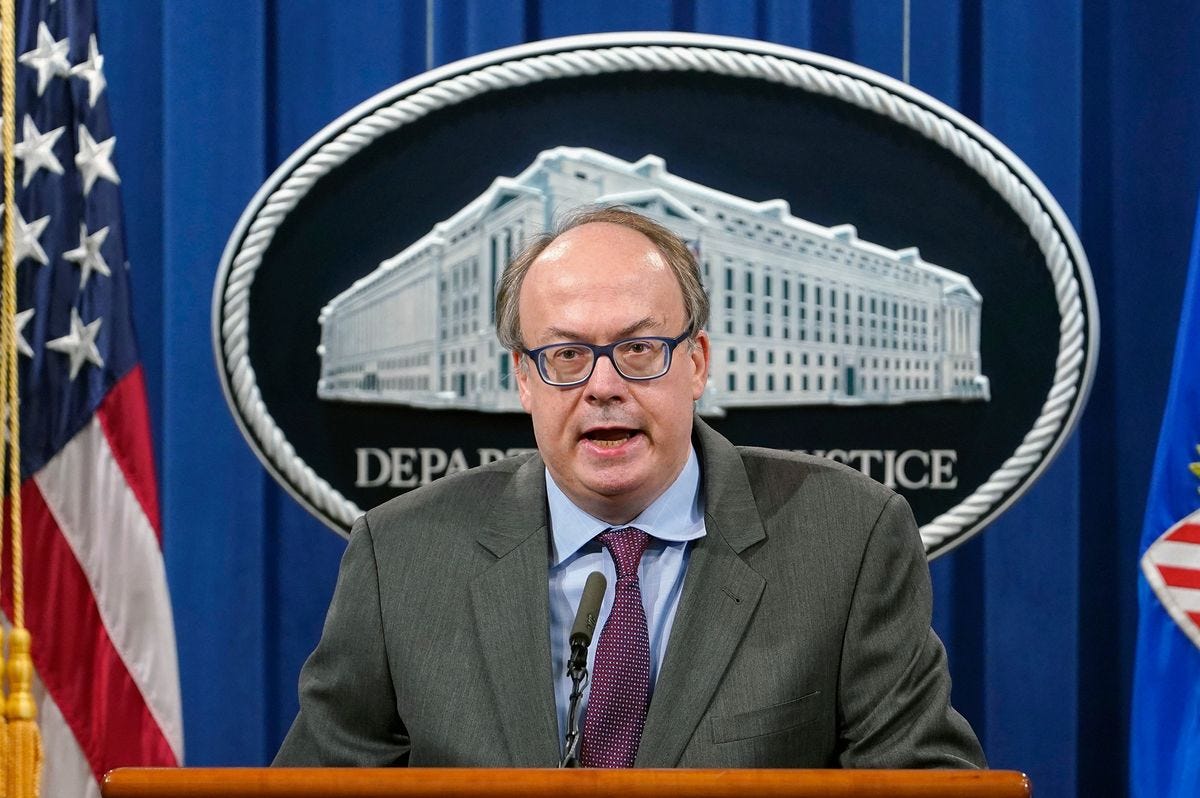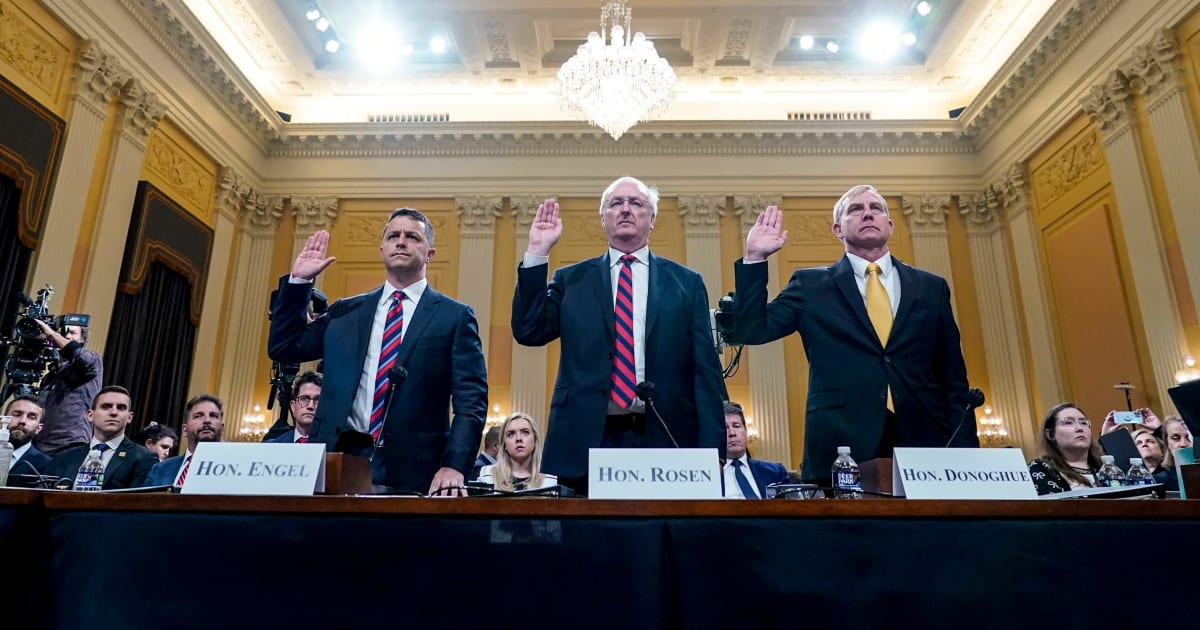Day Five of the January 6th Committee hearings technically began on Thursday at 3:00 p.m. in the Capitol. But you could argue that it actually started in the wee hours of the morning on Wednesday in suburban Virginia, where federal authorities executed a search warrant at the home of Jeffrey Clark, now at the center of the most significant political scandal in American history.
Clark’s current boss at an anti-critical race theory advocacy group, Russell Vought, is the one who whined to the press that the authorities “put him [Clark] in the street in his pajamas.” Vought dispensed this colorful detail as a way of previewing Clark’s I’m-being-persecuted defense. Never mind that the raid was authorized by a judge who found probable cause that a crime had been committed. Vought said the raid represents, "the weaponization of government.”
This is just another example of the long Trump tradition of projection. The real “weaponization,” of course, is what Trump was trying to do to the Justice Department—turn it into a weapon he could use to stay in power.
Day Five—“DOJ Day”— advanced our understanding of a desperate but increasingly coherent criminal conspiracy involving Clark, John Eastman, Ken Klukowski (who worked for Vought at OMB and served as the link between Eastman and Clark), Peter Navarro, members of the Freedom Caucus and, yes, Donald Trump, who now seems destined to become a target of the DOJ, which this week issued subpoenas to at least four fake Trump electors.
Clark is a familiar figure to anyone who has ever worked in an office — an almost comically-ambitious second-rate schemer who goes around the back of his superior to do the bidding of the big boss. It almost worked. If it had, the Department of Justice would have been pulled into the plot to have state legislatures re-certify the election and send slates of fake electors to Vice President Pence on January 6th, plunging the nation into a constitutional crisis.
This part of the story began in mid-December, 2020. After Attorney General William Barr told Trump the vote fraud allegations were “bullshit” and resigned, he was replaced as AG by Jeffrey Rosen, who on Thursday joined two other DOJ officials—Richard Donoghue and Steven Engel—in appearing in person before the committee. Like most of the Committee’s other Republican witnesses in the last two weeks, all three should have come forward during the second impeachment. But better late than never, and they will all make highly credible prosecution witnesses at trial.
Rosen testified that between December 23 and January 3, Trump was in touch with him “virtually every day.” Rosen, Donoghue and Engel resisted Trump’s outlandish conspiracy theories, like the one about the Italian defense contractor who uploaded data to a satellite and used it to change votes to Biden in the U.S.; ignored Trump’s request for a “meritless” (Engel’s words) lawsuit in the Supreme Court; and sidestepped Trump’s demand that a special counsel be appointed to investigate vote fraud, a job he had promised to kooky Sidney Powell. As Rep. Adam Kinzinger put it, the idea of a special counsel was just “fake cover” to provide an “illusion of legitimacy” to the idea of further probing non-existent vote fraud.
One of Trump’s scariest ideas was to “seize voting machines.” When informed that DOJ had no authority to do so, Trump immediately called Ken Cuccinelli, the right wing acting deputy secretary of the Department of Homeland Security. “Ken, I’m told it’s your job to seize machines and you’re not doing your job,” Trump barked. Even Cuccinelli, a dyed-in-the-wool MAGA man, wouldn’t buckle to that tinhorn dictator demand.
To me, a big Day Five moment missed by many analysts came when Donoghue testified that he took a notepad off his wife’s nightstand and wrote down what Trump was saying to him and Rosen on the phone:
“The President said ‘Just say the election was corrupt and leave the rest to me and the Republican Congressmen’…that’s an exact quote.”
I’m not a lawyer but that seems to me to be contemporaneous evidence of Trump directing a conspiracy. It’s also eerily reminiscent of Trump’s “perfect call” with Ukrainian President Volodymyr Zelensky in which he said “I would like you to do us a favor” and just announce an investigation into Hunter Biden. It resonates of a trademark Republican tactic that goes back to Karl Rove getting U.S. Attorneys to undertake and —more important—announce “investigations” of non-existent vote fraud by Democrats in 2002 and 2004. In fact, it goes back even further—to Joe McCarthy announcing “investigations” of communists in the state department and elsewhere.
When Trump referred confidently to “Republican congressmen” amplifying the Big Lie, he may have had in mind not just their public support for his phony claims but plotting that he and members of the Freedom Caucus did when they met with him at the White House on December 21. The list of those GOP House members who attended that meeting is an almost perfect match for those who after January 6 went to the White House seeking pardons. The obvious question: Why would they have sought them if they hadn’t done anything wrong?

By late December, Trump —who told one of his Fox flunkies, Maria Bartiromo, on air that DOJ was “missing in action”—realized he needed his own special stooge in the department. At the suggestion of Rep. Scott Perry (R-PA), he settled on Clark, an obscure advocate of fossil fuels whom Perry knew because of their work weakening environmental regulations. On December 15, someone still unidentified from the Trump/Eastman conspiracy dispatched reliable Trumpster Klukowski to DOJ to help Clark execute the plan. (Klukowski got to put the prestigious Justice Department on his resume for a month’s work trying to overturn an election).
Together they drafted an official DOJ letter to Georgia election authorities full of lies. In phony legal language, it “identified significant concerns that may have impacted the outcome of the election in multiple states, including the state of Georgia.” The letter went on to suggest that Georgia’s state legislature go into special session so that it could approve a slate of electors pledged to Trump. If the letter had been sent, it would have placed the imprimatur of the Department of Justice on efforts to overturn the election. And it might well have kicked off a move by Republican-controlled state legislatures in Biden states to certify fake Trump electors.
But Rosen and Donoghue angrily refused to sign the letter, telling Clark in a contentious meeting that it was wrong for DOJ “to meddle in an election.” That prompted the president to begin looking for his third attorney general in three weeks.
Eric Herschmann, a White House lawyer who is emerging as a potent and wonderfully profane witness, testified to what happened next: “Jeff Clark was proposing that Jeff Rosen be replaced by Jeff Clark”—an idea that Herschmann considered “asinine.” So, not surprisingly, did Clark’s boss, Rosen. He’d been irritated to hear that his subordinate was defying department rules and meeting with the president behind his back, and now he was enraged. He wouldn’t have minded resigning and being replaced by someone like Donoghue or Engel (“I’d get 17 days vacation or something”), but he wasn’t about to let Trump and Clark destroy the department and send the American political system into chaos.

Someone could write a whole book about the events of Sunday, January 3. Clark told Rosen that he would be taking his place as Attorney General but, hey, if he wanted, he could stay on as Clark’s deputy. Rosen, not surprisingly, thought he should be fired by the president directly and sought a hastily-scheduled meeting with Trump. He brought along several DOJ officials, all of whom (plus several assistant attorneys general who did not attend) said they would quit if Clark became AG.
Donoghue wasn’t planning to attend, in part because he was wearing muddy boots, an Army tee shirt and jeans. But Trump requested that he come into the Oval Office.
Trump, who according to phone logs already considered Clark his acting AG, asked, “What do I have to lose?” Donoghue said, “You’re going to lose your entire department’s leadership…You’re going to have hundreds and hundreds of resignations.”


Like an episode of The Apprentice, the meeting deteriorated into recriminations that left Clark looking like a loser, and thus fated to be cut loose by Trump. The other attorneys pointed out that he had no experience of any kind in criminal prosecutions and didn’t even know where the FBI Director’s office was located. Clark replied that he would withdraw his plan to be AG if Rosen and Donoghue signed the letter to the Georgia officials. At one point, Donoghue cracked, “How about you go back to your office and we’ll call you when there’s an oil spill.”
When Clark claimed implausibly that his legal specialty was relevant, Herschmann told him, “The only thing you know about environmental and elections challenges is they both start with ‘E’. And based on your answers tonight, I'm not even certain you know that.”
Trump was contemptuous of Rosen: “You, Rosen, you aren’t going to do anything.” Rosen said, “Well, Mr. President, you're right that I'm not going to allow the Justice Department to do anything to try to overturn the election. That's true. But the reason for that is because that's what's consistent with the facts and the law, and that's what's required under the Constitution.”
From reading earlier media accounts of this infamous meeting I was under the impression that Trump backed off in the face of this argument, which might have helped him in any trial. But it turns out that the reason he didn’t fire Rosen and have Clark send the letter was that it would have hurt him politically. White House Counsel Pat Cipollone argued that the firestorm caused by the mass resignations in the Justice Department would overshadow everything. He told Trump: “That letter is a murder-suicide pact. It's going to damage everyone who touches it.”
Until Day Five, we heard lots of legal analysis suggesting that because Trump truly believed in his twisted heart that he won the election, it would be hard to prove “consciousness of guilt” or “criminal intent.” But we now have voluminous evidence of his being repeatedly told by his own lawyers —Republican attorneys in the White House and DOJ—that there was no evidence of widespread vote fraud. This will help build not just a conspiracy case, but one that rests on “willful blindness,” a sturdy argument for prosecutors.
“If you rob a bank, it doesn’t matter if you think the bank owes you money,” Frank Figliuzzi, a former law enforcement official, said on MSNBC. Now that’s a point any jury can understand.
I posted an extensive recap of Day One, Day Two, Day Three and Day Four. I welcome your comments below on my take and on the broader story.
I’m off next week, but will be back in July when the hearings resume.








Like many others in despair at the start of the Trump regime, I searched my mind to discern the ultimate governmental backstop against the expected depredations that Trump would inflict on the traditional American political ethic. I felt that only the courts and the Dept. of Justice had enough backbone to prevent full-blown autocracy from metastasizing in our government. However, the appointment of AG Wm. Barr and the raft of federal judgeship appointees only deepened my depression.
Now the J6 hearings have brightened my feelings by revealing the integrity of the late inning DOJ leadership in the hour of their greatest challenge.
Orange jumpsuit on the way.